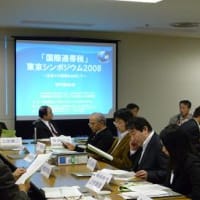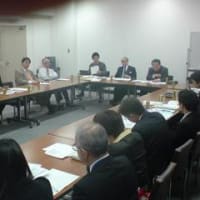
ドストゥ=ブラジ氏は現在“国連事務次長/開発のための革新的資金調達担当・国連事務総長特別顧問/UNITAID理事長”という肩書を持っていますが、ご存じのようにフランスが2006年に国際連帯税(航空券税)を実施した時の外務大臣で、いわば国際連帯税の立役者の一人です。
当日のスピーチでは、国際連帯税のバックボーンとなる思想について、すなわち現在の金融・経済危機はグローバル化の危機につながり、ひいては倫理の危機や人間の堕落(個人主義の称賛)をもたらしていること、これに対抗するには連帯のグローバル化が必要不可欠であること、が訴えられました。銀行を救済する資金はありながら、ミレニアム開発目標達成のための資金を創出しようとしない現実を鋭く告発しています。
以下、全文(日本語)と原文(英語)をご覧ください。
シンポジウム「希望と連帯」
2010年12月15日 東京
親愛なる皆様
はじめに、本日この場に同席できることを大変幸せに思っている事をお伝え申し上げます。
実際、市民社会のご協力がなければ航空券税、ひいてはUNITAID(ユニットエイド)の実現は不可能でした。
皆様が私どもの側に立ち日本の官庁に航空券税導入を働きかけて下さっている事を非常によく知っております。これは前進に向けた大きな一歩となるでしょう。
そこで、日本の皆様に心から感謝を致しております。(日本語で「ありがとう。」)
現在の危機はグローバル化の危機であり、私たちが何とか阻止しないとますます悪くなり文明全体の危機となります。
サブプライムローン、銀行の救済計画、景気刺激策、ソブリン(国家)債務危機と金融混乱、予算調整。この2年間、これらの難解な用語が公の場の議論の一部となってきました。これらは同じ芝居中の連続した幕のようであり、めまいのするような大量の統計に囲まれて、私たちを単なる観客として遠く離れた劇場で上演されているように感じられることがあります。
そして未だに、食糧危機、健康指標と社会指標の低下、絶望的な貧困の再発、紛争の再燃など、現在の危機がもたらした結果はすでに、発展の約束が跡形もなく消えてしまったと考える何百万人もの人々(男性、女性、子供すべて)の人生の中で感じられています。
世界銀行によると、更に20万人から40万人の子供たちがこの危機の犠牲となって命を落とす可能性があるというのです。1分間毎に1人の母親が死亡しており、3秒毎に1人の子供が治療可能な病気で死亡しています。現代における最大のスキャンダルです。
いつものことですが、最も貧しく脆弱な国々がはじめにそして最もひどく影響を受けます。しかしこの危機の波は非常に強く、先進国の社会の土台をも崩壊させようとしています。
熱心な市民、責任感のある市民の皆様、現在起こっている出来事はすべてを台無しにしてしまう恐れがあるので、私たち全員に関係があるのです。
この危機の原因はそもそも経済と金融の不均衡にあります。
しかし、おそらくより深いレベルでは、倫理の危機や社会全体における人々の生活を蝕む人間の堕落があるでしょう。
それは、個人主義の称賛です。
私たちがこれらのグローバル化による倫理的失敗を早急に一掃し、それらの失敗を私たちの社会契約の根底において正義と人間性の感覚に換えることを行わなければ、私たちはこの危機から脱出することはできないでしょう。
最終的に私たちが真の連帯のグローバル化、それは経済のグローバル化に不可欠な相手ですが、それに全力を傾けることによってのみこの危機を乗り越えることができるでしょう。
2010年9月の国連総会の間、ODAの増額と共に新しい資金調達源について大きな成果がなければミレニアム開発目標の項目4、5、6(訳者注1)の達成が困難であると認識しました。
今もなお10億人の人々に影響をもたらしている飢饉を制圧するための資金はありません。しかし、銀行は救われました。
全ての子供に初等教育を保証するために必要な資金はありません。しかし、銀行は救われました。
全ての人に安全な水と衛生を保証するために必要な資金はありません。しかし、銀行は救われました。
この十年間で国際的連帯が強まり大きな進歩をしたにも関わらず、エイズ、マラリア、結核と戦うための資金はもうありません。しかし、銀行は救われました。
もちろん私たちは全員、政府支出と開発援助予算に対する制約があることを知っています。しかし、代替的な資金源があり、グローバル化が生み出した大量の資金の一部を取り入れる革新的な資金調達手段があることも知っています。
私が2006年から理事長を務めさせていただいているUNITAIDとともに、私たちは経済の機能を損なうことなく新しい追加的かつ永続的な資金調達を行うことが可能であることを実証してきました。
私たちは実際に、もし目標がしっかりとしていればこれらの資金は現在直面している状況を急速に変えることができることを示しました。
そしてわずか3年間でUNITAIDからの資金は、エイズ患者の子供40万人に抗レトロウイルス治療(同じ病気の子供に対する世界全体の治療数の4分の3)と製薬業界からの子供用エイズ治療薬の価格の60%削減を実現しました。
このすばらしい成功により、UNITAIDは開発のための革新的な資金調達の実験施設となりました。UNITAIDはその資金源のおかげでモデルとなりました。資金源は先駆的な国々が導入した航空券に課される最低額の税金です。
モデルとなる理由は、その資金源の用途によります。資金は主要な感染症、特にエイズ治療薬の公平な入手に関して急速な変化を可能にしました。
モデルとなる理由は、そのガバナンスにおいて市民社会を巻き込んだ方法とプログラムが定義・管理される方法にもあります。
現在、開発援助を提供する各国の財政危機に直面し、国際社会はUNITAIDをモデルとして新しく革新的な資金調達方法を作り上げることを必要としています。
UNITAIDに関して言わせていただけるのであれば、NGOと市民社会のおかげです。それゆえに、私は皆様のご尽力をよく理解しております。
2006年に私はパリで最貧国援助のための新しい資金源を考えるために複数国のグループを設立しましたが、日本は最初から加わっていました。
私は日本の国際援助の重要性を理解しています。私は日本の皆様の寛大さを高く評価しております。だからこそ、日本はその取り組みをより具体的にするべきと考えるのです。
もし日本政府がまったく支障のない小さな金額をすべての航空券に加えると保証すれば、海外渡航する日本人はそうでなければ救われることのない女性や子供の治療に貢献することになります。
もし日本がUNITAIDを支持すれば、その貢献額である3億ドルが女性エイズ患者の出産時における子供への感染を防ぐための”Mother Baby Pack” (訳者注2)に使えます。
それは、30秒毎に1人の子供の命を奪うマラリアの除去を可能にするかもしれません。
そうです、親愛なる皆様、グローバル化の恩恵を受けた経済活動と繋がった連帯的なミクロ貢献をするべきなのです。そのような経済活動とは、航空券を使用する観光だけでなく、携帯電話の使用、インターネット、金融市場にまで及びます。
次のステージは明らかです。金融取引に対する課税の導入です。
金融取引への課税に関しましては、政治的契機は2011年だと確信しております。フランスがG20の議長国を務め、フランス大統領が金融取引への課税を優先事項とするからです。
ただ、避けなければならない罠もあります。全会一致のルールです。もし実際フランスがユーロ圏の一致を待たなければならない場合、私たちは長く待たなければならないし、それはG20においても同様です。
もし私たちが、技術的にすべての地域に同レベルでの適用が必要な税金を目指すのであれば、その地域における全会一致の可能性に左右されることとなります。全会一致のルールは、合意を妨げるいかなる国にも権力が与えられることを暗に示しています。
したがって、2011年に合意に達することができないというリスクは高まっています。技術的に他国に同等の実施を求めることのない税金を目指すのが賢明です。
この一方向の税金が、フランスと共に金融取引税(FTT)の先駆者となろうとするパートナー国によって設立されるでしょう。パートナー国の例として日本があげられます。
設立グループに続いて、しばらくすれば、他の国々もFTTの参加国となるでしょう。
国際FTTの例としては、英国の例があります。英国通貨を送金する際にかかる英国の「印紙税」は、毎年40億ユーロほどを調達しています(訳者注3)。
皆様、私が申し上げたいのは、以上です。私たちの闘いははっきりしています。経済のグローバル化と併行してグローバル化した連帯を築き上げることです。
日本におけるご支援に感謝を申し上げます。日本は、まさしく「連帯」という言葉が当てはまると思います。
フィリップ・ドストゥ=ブラジ
国連事務次長
開発のための革新的資金調達担当・国連事務総長特別顧問
UNITAID理事長
<翻訳;日本リザルツ>
(訳者注1)ミレニアム開発目標のうちの保健分野の目標。目標4(5歳未満の死亡率を3分の2低下させること)、目標5(妊産婦死亡率を4分の3低下させること)、目標6(HIV/エイズ、マラリアおよび結核の蔓延を逆転させること)。いずれも期限は2015年までに。
(訳者注2)ユニセフが開発した“HIV母子感染防止パック”のことで、UNITAIDも資金提供等で貢献している。「母子感染を防止するため、このパックには、必要な感染防止薬が入っています。保¬健センターや病院が遠くて何度も通えない妊産婦さんも、このパックがあれば安心です。¬薬が入った箱は、使用時期に合わせて色分けされており、使用方法もイラストで分かりや¬すく描かれているので、文字が読めない人でも理解できます」。
*詳しくは、http://www.unicef.or.jp/campaign/051025/kuni23.html
http://www.unitaid.eu/ のA New Tool Gives Hope for Greatly Reducing AIDS in Children
(訳者注3)株式取引にかかる税率0.5%の印紙税のこと。
*詳しくは、http://blog.goo.ne.jp/global-tax/e/c3f144efebc4fa6d231edd16bcd85ed1
Symposium “Hope and Solidarity”
Tokyo, 15 December 2010
Dear Friends,
I would first like to tell you how much I am happy to be with you today.
Indeed, without civil society, we would never have created the tax on plane tickets and therefore UNITAID.
I am very aware of your fight by our side to ask the Japanese authorities to establish a tax on place tickets. This would be a very big step forward.
And so, from the bottom of my heart: thank you [In Japanese].
The current crisis is a crisis of globalization which may, if we do not manage to stop it, degenerate into a crisis of civilisation.
Sub-prime mortgages, rescue plans for the banks, stimulus plans, the sovereign debt crisis and monetary disorder, budget adjustments: over the past two years these esoteric terms have become part of the public debate. They are successive acts of the same play, which sometimes seems, in its dizzying barrage of statistics, to be taking place on the stage of a distant theatre in which we are simply spectators.
And yet…a crisis in food supply, the deterioration of health and social indicators, the resurgence of abject poverty and the return of conflict: the consequences of this crisis are already making themselves felt in the lives of millions of men, women and children who are seeing all the promises of progress disappear into thin air.
According to the World Bank, an additional 200,000 to 400,000 children could pay the price of this crisis with their lives.
One mother dies every minute, one child every three seconds from curable diseases. The greatest scandal of our time.
As always, it is the poorest and most vulnerable countries that are the first and most badly affected. But the wave is so strong that it is beginning to undermine the very foundations of society in the developed countries.
Committed citizens, responsible citizens: what is happening now concerns us all, since it threatens to sweep everything away.
At the roots of the crisis there are naturally economic and financial imbalances.
But there is also, and perhaps at a deeper level, a moral crisis, a corruption of human values that is undermining the lives of everyone in society.
The glorification of individualism.
This is why we will not emerge from this crisis unless we very rapidly purge these moral failings of globalisation; unless we replace them at the heart of our social contract with a sense of justice and the idea of humanity.
We will only emerge from this crisis if we finally commit ourselves to a veritable globalisation of solidarity, the unavoidable counterpart of economic globalisation.
During the General Assembly of the United Nations last September we saw that we will not be able to achieve Millennium Goal 4,5 and 6 if we do not quickly make extensive progress to create new sources of financing while still increasing ODA.
There is no more money to conquer the hunger that still affects a billion human beings? But they saved the banks!
There is no more money to ensure universal primary education? But they saved the banks!
There is no more money to make sure that everyone has access to clean water and sanitation? But they saved the banks!
There is no more money to combat AIDS, malaria and tuberculosis, in spite of all the progress made by mobilising international solidarity over the last decade? But they saved the banks!
Certainly, we all know about the current constraints on government spending and on development aid budgets. But we also know that alternative resources exist, that there are innovative financing methods that can mobilise a fraction of the immense resources generated by globalisation to pay for the necessary effort of solidarity.
With UNITAID, which I have had the honour of leading since 2006, we have shown that it is possible to mobilise new, additional and permanent resources, without disturbing the functioning of the economy.
We have demonstrated that, if well targeted, these resources can radically change the situation we are facing.
So, in the space of only three years, financing from UNITAID has provided anti-retroviral treatment for 400,000 children who are victims of AIDS (three out four children treated for this illness in the world) and also obtained from the pharmaceutical industry a 60% reduction in the cost of anti-AIDS drugs for paediatric use.
Because of its remarkable success, UNITAID has emerged as a laboratory of innovative financing for development. It is a model thanks to the source of its financing: a minimum tax on airplane tickets introduced by a pioneering group of countries.
A model because of the way it uses its resources, which has enabled a radical change in the terms of the equation for access to drugs against major pandemics, and particularly AIDS.
A model because of the way it has involved civil society in its governance as well as the way its programmes have been defined and managed.
Today, faced with the crisis in the public finances of the countries that provide development aid, the international community needs to use UNITAID as a model to help it make progress in setting up new and innovative ways of raising funds.
If I speak of UNITAID to you here, NGOs and civil society, It is because I know of your fight to help us.
It is because Japan has since the beginning been in the group of countries that I created in 2006 in Paris to think about new sources of Financing for the poorest countries.
I understand the importance of international aid given by Japan. I appreciate the generosity of the Japanese people. It is why I think that your country must now make its engagement more concrete.
If your government pledges to add a completely innocuous dollar to every plane ticket, then every Japanese that will travel abroad will contribute to treating women and children that otherwise would never have been helped.
If Japan adhered to UNITAID, then it would be 300 million dollars that could provide access to this "Mother Baby Pack" for women with aids, avoiding transmitting death while giving life.
It would be the possibility of eliminating malaria, which kills one child every 30 seconds.
Yes, dear friends, we must establish micro-contributions of solidarity linked to economic activities that have profited from globalization, like tourism with plane tickets but also with cell phone usage, internet, or even financial markets.
The next stage is obvious: introducing a tax on financial transactions.
Concerning the taxes on financial transactions, I am sure that the political momentum is in 2011. France presides the G20 and the French President made it a priority.
But there is a trap to avoid, that of unanimity.
If indeed, France has to wait that the entire euro zone agrees, we can wait for a long time, idem for the G20.
If we aim for a tax that, in its technical construction, needs to be established at the level of an entire zone, we become dependent on the possibility of a unanimous agreement -- the scale of this zone.
Unanimity implies giving the power to whichever State that blocks an agreement.
The risks to not reach an agreement in 2011 therefore greatly increases. It is therefore wise to aim for a tax that, in its technical construction, does not require a parallel installment in another country.
This unilateral tax will therefore be established by each partner country which, with France, wishes to be the pioneers of this Financial Transaction Tax (FTT). For example Japan.
After this founding group, as the years go by, other countries will join the participants of the FTT.
The technical model should inspire for the international FTT: the "Stamp Duty Reserve Tax" unilateral existing in Great-Britain on the transfers of English money, which raises about 4 billion euros per year.
This concludes, Dear Friends, what I wanted to tell you.
Our fight must be clear: to build a globalized solidarity next to an economic globalization.
Thank you for helping us here in Japan, where the word "Solidarity" sounds just.
Philippe Douste-Blazy
UN Under-Secretary-General
Special Adviser to the Secretary-General in charge on Innovative Financing for Development
Chairman of UNITAID
当日のスピーチでは、国際連帯税のバックボーンとなる思想について、すなわち現在の金融・経済危機はグローバル化の危機につながり、ひいては倫理の危機や人間の堕落(個人主義の称賛)をもたらしていること、これに対抗するには連帯のグローバル化が必要不可欠であること、が訴えられました。銀行を救済する資金はありながら、ミレニアム開発目標達成のための資金を創出しようとしない現実を鋭く告発しています。
以下、全文(日本語)と原文(英語)をご覧ください。
シンポジウム「希望と連帯」
2010年12月15日 東京
親愛なる皆様
はじめに、本日この場に同席できることを大変幸せに思っている事をお伝え申し上げます。
実際、市民社会のご協力がなければ航空券税、ひいてはUNITAID(ユニットエイド)の実現は不可能でした。
皆様が私どもの側に立ち日本の官庁に航空券税導入を働きかけて下さっている事を非常によく知っております。これは前進に向けた大きな一歩となるでしょう。
そこで、日本の皆様に心から感謝を致しております。(日本語で「ありがとう。」)
現在の危機はグローバル化の危機であり、私たちが何とか阻止しないとますます悪くなり文明全体の危機となります。
サブプライムローン、銀行の救済計画、景気刺激策、ソブリン(国家)債務危機と金融混乱、予算調整。この2年間、これらの難解な用語が公の場の議論の一部となってきました。これらは同じ芝居中の連続した幕のようであり、めまいのするような大量の統計に囲まれて、私たちを単なる観客として遠く離れた劇場で上演されているように感じられることがあります。
そして未だに、食糧危機、健康指標と社会指標の低下、絶望的な貧困の再発、紛争の再燃など、現在の危機がもたらした結果はすでに、発展の約束が跡形もなく消えてしまったと考える何百万人もの人々(男性、女性、子供すべて)の人生の中で感じられています。
世界銀行によると、更に20万人から40万人の子供たちがこの危機の犠牲となって命を落とす可能性があるというのです。1分間毎に1人の母親が死亡しており、3秒毎に1人の子供が治療可能な病気で死亡しています。現代における最大のスキャンダルです。
いつものことですが、最も貧しく脆弱な国々がはじめにそして最もひどく影響を受けます。しかしこの危機の波は非常に強く、先進国の社会の土台をも崩壊させようとしています。
熱心な市民、責任感のある市民の皆様、現在起こっている出来事はすべてを台無しにしてしまう恐れがあるので、私たち全員に関係があるのです。
この危機の原因はそもそも経済と金融の不均衡にあります。
しかし、おそらくより深いレベルでは、倫理の危機や社会全体における人々の生活を蝕む人間の堕落があるでしょう。
それは、個人主義の称賛です。
私たちがこれらのグローバル化による倫理的失敗を早急に一掃し、それらの失敗を私たちの社会契約の根底において正義と人間性の感覚に換えることを行わなければ、私たちはこの危機から脱出することはできないでしょう。
最終的に私たちが真の連帯のグローバル化、それは経済のグローバル化に不可欠な相手ですが、それに全力を傾けることによってのみこの危機を乗り越えることができるでしょう。
2010年9月の国連総会の間、ODAの増額と共に新しい資金調達源について大きな成果がなければミレニアム開発目標の項目4、5、6(訳者注1)の達成が困難であると認識しました。
今もなお10億人の人々に影響をもたらしている飢饉を制圧するための資金はありません。しかし、銀行は救われました。
全ての子供に初等教育を保証するために必要な資金はありません。しかし、銀行は救われました。
全ての人に安全な水と衛生を保証するために必要な資金はありません。しかし、銀行は救われました。
この十年間で国際的連帯が強まり大きな進歩をしたにも関わらず、エイズ、マラリア、結核と戦うための資金はもうありません。しかし、銀行は救われました。
もちろん私たちは全員、政府支出と開発援助予算に対する制約があることを知っています。しかし、代替的な資金源があり、グローバル化が生み出した大量の資金の一部を取り入れる革新的な資金調達手段があることも知っています。
私が2006年から理事長を務めさせていただいているUNITAIDとともに、私たちは経済の機能を損なうことなく新しい追加的かつ永続的な資金調達を行うことが可能であることを実証してきました。
私たちは実際に、もし目標がしっかりとしていればこれらの資金は現在直面している状況を急速に変えることができることを示しました。
そしてわずか3年間でUNITAIDからの資金は、エイズ患者の子供40万人に抗レトロウイルス治療(同じ病気の子供に対する世界全体の治療数の4分の3)と製薬業界からの子供用エイズ治療薬の価格の60%削減を実現しました。
このすばらしい成功により、UNITAIDは開発のための革新的な資金調達の実験施設となりました。UNITAIDはその資金源のおかげでモデルとなりました。資金源は先駆的な国々が導入した航空券に課される最低額の税金です。
モデルとなる理由は、その資金源の用途によります。資金は主要な感染症、特にエイズ治療薬の公平な入手に関して急速な変化を可能にしました。
モデルとなる理由は、そのガバナンスにおいて市民社会を巻き込んだ方法とプログラムが定義・管理される方法にもあります。
現在、開発援助を提供する各国の財政危機に直面し、国際社会はUNITAIDをモデルとして新しく革新的な資金調達方法を作り上げることを必要としています。
UNITAIDに関して言わせていただけるのであれば、NGOと市民社会のおかげです。それゆえに、私は皆様のご尽力をよく理解しております。
2006年に私はパリで最貧国援助のための新しい資金源を考えるために複数国のグループを設立しましたが、日本は最初から加わっていました。
私は日本の国際援助の重要性を理解しています。私は日本の皆様の寛大さを高く評価しております。だからこそ、日本はその取り組みをより具体的にするべきと考えるのです。
もし日本政府がまったく支障のない小さな金額をすべての航空券に加えると保証すれば、海外渡航する日本人はそうでなければ救われることのない女性や子供の治療に貢献することになります。
もし日本がUNITAIDを支持すれば、その貢献額である3億ドルが女性エイズ患者の出産時における子供への感染を防ぐための”Mother Baby Pack” (訳者注2)に使えます。
それは、30秒毎に1人の子供の命を奪うマラリアの除去を可能にするかもしれません。
そうです、親愛なる皆様、グローバル化の恩恵を受けた経済活動と繋がった連帯的なミクロ貢献をするべきなのです。そのような経済活動とは、航空券を使用する観光だけでなく、携帯電話の使用、インターネット、金融市場にまで及びます。
次のステージは明らかです。金融取引に対する課税の導入です。
金融取引への課税に関しましては、政治的契機は2011年だと確信しております。フランスがG20の議長国を務め、フランス大統領が金融取引への課税を優先事項とするからです。
ただ、避けなければならない罠もあります。全会一致のルールです。もし実際フランスがユーロ圏の一致を待たなければならない場合、私たちは長く待たなければならないし、それはG20においても同様です。
もし私たちが、技術的にすべての地域に同レベルでの適用が必要な税金を目指すのであれば、その地域における全会一致の可能性に左右されることとなります。全会一致のルールは、合意を妨げるいかなる国にも権力が与えられることを暗に示しています。
したがって、2011年に合意に達することができないというリスクは高まっています。技術的に他国に同等の実施を求めることのない税金を目指すのが賢明です。
この一方向の税金が、フランスと共に金融取引税(FTT)の先駆者となろうとするパートナー国によって設立されるでしょう。パートナー国の例として日本があげられます。
設立グループに続いて、しばらくすれば、他の国々もFTTの参加国となるでしょう。
国際FTTの例としては、英国の例があります。英国通貨を送金する際にかかる英国の「印紙税」は、毎年40億ユーロほどを調達しています(訳者注3)。
皆様、私が申し上げたいのは、以上です。私たちの闘いははっきりしています。経済のグローバル化と併行してグローバル化した連帯を築き上げることです。
日本におけるご支援に感謝を申し上げます。日本は、まさしく「連帯」という言葉が当てはまると思います。
フィリップ・ドストゥ=ブラジ
国連事務次長
開発のための革新的資金調達担当・国連事務総長特別顧問
UNITAID理事長
<翻訳;日本リザルツ>
(訳者注1)ミレニアム開発目標のうちの保健分野の目標。目標4(5歳未満の死亡率を3分の2低下させること)、目標5(妊産婦死亡率を4分の3低下させること)、目標6(HIV/エイズ、マラリアおよび結核の蔓延を逆転させること)。いずれも期限は2015年までに。
(訳者注2)ユニセフが開発した“HIV母子感染防止パック”のことで、UNITAIDも資金提供等で貢献している。「母子感染を防止するため、このパックには、必要な感染防止薬が入っています。保¬健センターや病院が遠くて何度も通えない妊産婦さんも、このパックがあれば安心です。¬薬が入った箱は、使用時期に合わせて色分けされており、使用方法もイラストで分かりや¬すく描かれているので、文字が読めない人でも理解できます」。
*詳しくは、http://www.unicef.or.jp/campaign/051025/kuni23.html
http://www.unitaid.eu/ のA New Tool Gives Hope for Greatly Reducing AIDS in Children
(訳者注3)株式取引にかかる税率0.5%の印紙税のこと。
*詳しくは、http://blog.goo.ne.jp/global-tax/e/c3f144efebc4fa6d231edd16bcd85ed1
Symposium “Hope and Solidarity”
Tokyo, 15 December 2010
Dear Friends,
I would first like to tell you how much I am happy to be with you today.
Indeed, without civil society, we would never have created the tax on plane tickets and therefore UNITAID.
I am very aware of your fight by our side to ask the Japanese authorities to establish a tax on place tickets. This would be a very big step forward.
And so, from the bottom of my heart: thank you [In Japanese].
The current crisis is a crisis of globalization which may, if we do not manage to stop it, degenerate into a crisis of civilisation.
Sub-prime mortgages, rescue plans for the banks, stimulus plans, the sovereign debt crisis and monetary disorder, budget adjustments: over the past two years these esoteric terms have become part of the public debate. They are successive acts of the same play, which sometimes seems, in its dizzying barrage of statistics, to be taking place on the stage of a distant theatre in which we are simply spectators.
And yet…a crisis in food supply, the deterioration of health and social indicators, the resurgence of abject poverty and the return of conflict: the consequences of this crisis are already making themselves felt in the lives of millions of men, women and children who are seeing all the promises of progress disappear into thin air.
According to the World Bank, an additional 200,000 to 400,000 children could pay the price of this crisis with their lives.
One mother dies every minute, one child every three seconds from curable diseases. The greatest scandal of our time.
As always, it is the poorest and most vulnerable countries that are the first and most badly affected. But the wave is so strong that it is beginning to undermine the very foundations of society in the developed countries.
Committed citizens, responsible citizens: what is happening now concerns us all, since it threatens to sweep everything away.
At the roots of the crisis there are naturally economic and financial imbalances.
But there is also, and perhaps at a deeper level, a moral crisis, a corruption of human values that is undermining the lives of everyone in society.
The glorification of individualism.
This is why we will not emerge from this crisis unless we very rapidly purge these moral failings of globalisation; unless we replace them at the heart of our social contract with a sense of justice and the idea of humanity.
We will only emerge from this crisis if we finally commit ourselves to a veritable globalisation of solidarity, the unavoidable counterpart of economic globalisation.
During the General Assembly of the United Nations last September we saw that we will not be able to achieve Millennium Goal 4,5 and 6 if we do not quickly make extensive progress to create new sources of financing while still increasing ODA.
There is no more money to conquer the hunger that still affects a billion human beings? But they saved the banks!
There is no more money to ensure universal primary education? But they saved the banks!
There is no more money to make sure that everyone has access to clean water and sanitation? But they saved the banks!
There is no more money to combat AIDS, malaria and tuberculosis, in spite of all the progress made by mobilising international solidarity over the last decade? But they saved the banks!
Certainly, we all know about the current constraints on government spending and on development aid budgets. But we also know that alternative resources exist, that there are innovative financing methods that can mobilise a fraction of the immense resources generated by globalisation to pay for the necessary effort of solidarity.
With UNITAID, which I have had the honour of leading since 2006, we have shown that it is possible to mobilise new, additional and permanent resources, without disturbing the functioning of the economy.
We have demonstrated that, if well targeted, these resources can radically change the situation we are facing.
So, in the space of only three years, financing from UNITAID has provided anti-retroviral treatment for 400,000 children who are victims of AIDS (three out four children treated for this illness in the world) and also obtained from the pharmaceutical industry a 60% reduction in the cost of anti-AIDS drugs for paediatric use.
Because of its remarkable success, UNITAID has emerged as a laboratory of innovative financing for development. It is a model thanks to the source of its financing: a minimum tax on airplane tickets introduced by a pioneering group of countries.
A model because of the way it uses its resources, which has enabled a radical change in the terms of the equation for access to drugs against major pandemics, and particularly AIDS.
A model because of the way it has involved civil society in its governance as well as the way its programmes have been defined and managed.
Today, faced with the crisis in the public finances of the countries that provide development aid, the international community needs to use UNITAID as a model to help it make progress in setting up new and innovative ways of raising funds.
If I speak of UNITAID to you here, NGOs and civil society, It is because I know of your fight to help us.
It is because Japan has since the beginning been in the group of countries that I created in 2006 in Paris to think about new sources of Financing for the poorest countries.
I understand the importance of international aid given by Japan. I appreciate the generosity of the Japanese people. It is why I think that your country must now make its engagement more concrete.
If your government pledges to add a completely innocuous dollar to every plane ticket, then every Japanese that will travel abroad will contribute to treating women and children that otherwise would never have been helped.
If Japan adhered to UNITAID, then it would be 300 million dollars that could provide access to this "Mother Baby Pack" for women with aids, avoiding transmitting death while giving life.
It would be the possibility of eliminating malaria, which kills one child every 30 seconds.
Yes, dear friends, we must establish micro-contributions of solidarity linked to economic activities that have profited from globalization, like tourism with plane tickets but also with cell phone usage, internet, or even financial markets.
The next stage is obvious: introducing a tax on financial transactions.
Concerning the taxes on financial transactions, I am sure that the political momentum is in 2011. France presides the G20 and the French President made it a priority.
But there is a trap to avoid, that of unanimity.
If indeed, France has to wait that the entire euro zone agrees, we can wait for a long time, idem for the G20.
If we aim for a tax that, in its technical construction, needs to be established at the level of an entire zone, we become dependent on the possibility of a unanimous agreement -- the scale of this zone.
Unanimity implies giving the power to whichever State that blocks an agreement.
The risks to not reach an agreement in 2011 therefore greatly increases. It is therefore wise to aim for a tax that, in its technical construction, does not require a parallel installment in another country.
This unilateral tax will therefore be established by each partner country which, with France, wishes to be the pioneers of this Financial Transaction Tax (FTT). For example Japan.
After this founding group, as the years go by, other countries will join the participants of the FTT.
The technical model should inspire for the international FTT: the "Stamp Duty Reserve Tax" unilateral existing in Great-Britain on the transfers of English money, which raises about 4 billion euros per year.
This concludes, Dear Friends, what I wanted to tell you.
Our fight must be clear: to build a globalized solidarity next to an economic globalization.
Thank you for helping us here in Japan, where the word "Solidarity" sounds just.
Philippe Douste-Blazy
UN Under-Secretary-General
Special Adviser to the Secretary-General in charge on Innovative Financing for Development
Chairman of UNITAID



















